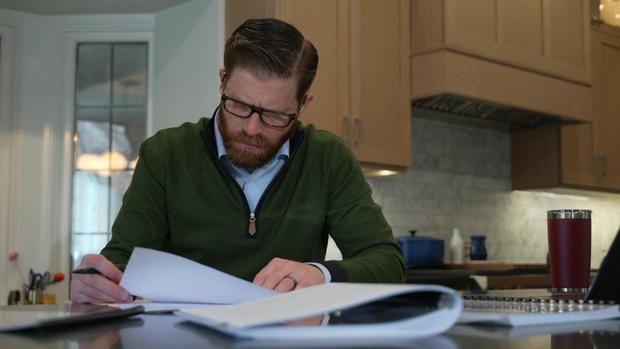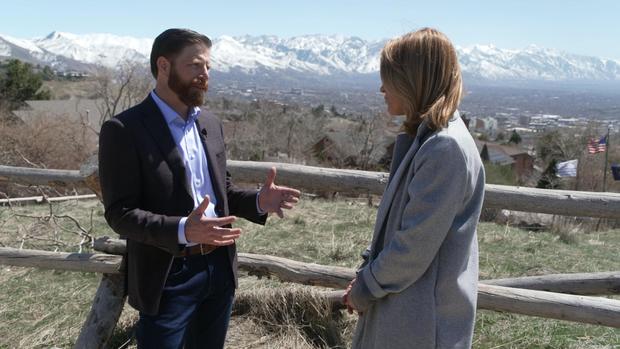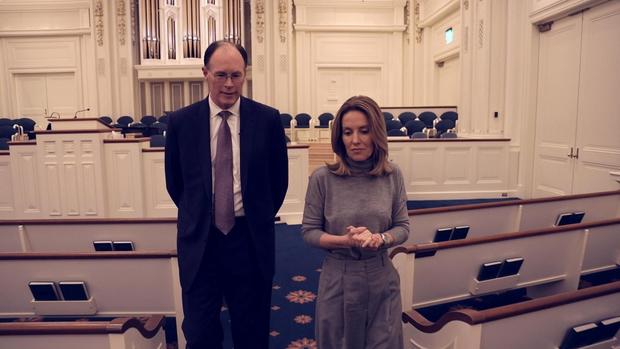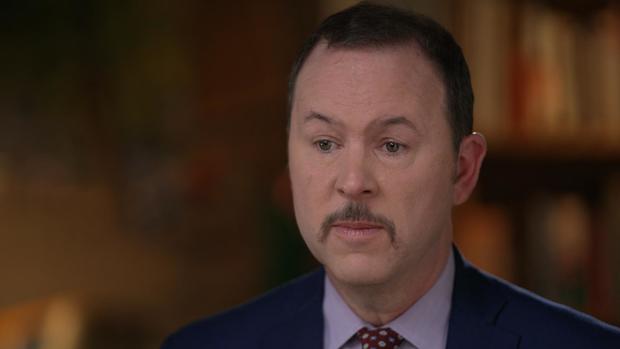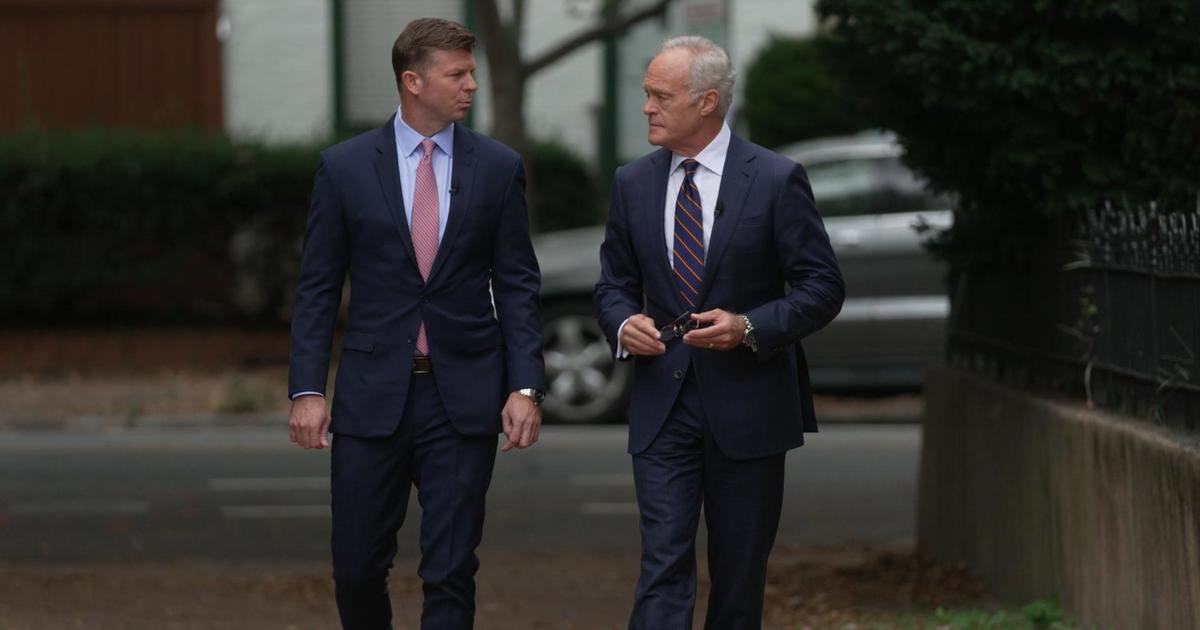Mormon who left Wall St. to work for charity blows whistle on what he says is his church's "clandestine hedge fund"
Every religion has its mysteries. One of the closest guarded secrets of The Church of Jesus Christ of Latter-day Saints has been its wealth. In this report, you will hear for the first time about its remarkable size from a former manager at the church's investment firm. David Nielsen says that during his nine years managing money at the church firm, the value of its investments ballooned past $100 billion. That would make it the largest treasure held by any religious fund in America. But instead of spending that money to do good, David Nielsen alleges it was used in ways that bent the law ... and broke his faith.
David Nielsen: I thought I was gonna work for a charity. I thought that's what my skills were gonna do…was help build the charity and do good with things. And the funds were never used for that. It was really a clandestine hedge fund.
Sharyn Alfonsi: A clandestine hedge fund. How so?
David Nielsen: Those funds weren't used the way they were appropriated to be used.
Sharyn Alfonsi: So how were they being used?
David Nielsen: Well, once the money went in, it didn't go out.
David Nielsen was a senior portfolio manager for the investment arm of the church, called Ensign Peak Advisors.
In 2009, Nielsen, who says he was a devout Mormon, was recruited away from a lucrative job on Wall Street to work for the firm, a block from church headquarters in Salt Lake City.
David Nielsen: You know this. Wall Street, you spend your skills working to make really rich people a little bit more rich — but there is something different about the prospect of putting your skills to work for something that you think is really gonna build the kingdom. It's really gonna make a difference.
But Nielsen says he grew troubled by what he saw at Ensign Peak. He says the firm used false records and statements to masquerade as a charity, stockpiling money and misleading church members.
Every year, the church collects an estimated $7 billion in contributions from its 17 million members.
The church expects members to contribute about 10% of their income…a practice known as tithing.
Sharyn Alfonsi: Explain how the tithe is supposed to be used.
David Nielsen: Tithing is what's used to build buildings, it's what's used to pay light bills. Tithing is what's used to— operate some of the church's programs.
Whatever is left over — about a billion dollars a year — is put into a reserve fund at Ensign Peak and invested. Because Ensign Peak is registered as a nonprofit, it all grows tax-free.
David Nielsen says since it was created in 1997, the reserve fund has swelled beyond $100 billion — twice the size of Harvard's endowment or the Bill and Melinda Gates Foundation.
David Nielsen: You could solve big problems with $100 billion.
Sharyn Alfonsi: And is that the thing that bothers you about all this?
David Nielsen: I thought we were gonna change the world. And we just grew the bank account.
Sharyn Alfonsi: Did any of your former bosses explain how the money was gonna be used one day?
David Nielsen: The answer was always, "The second coming." And it's a bit tongue in cheek. But deep down, I think a lot of the employees really did believe that.
Publicly, church leaders called it a rainy day fund. But in 2013, Nielsen says one of his bosses shared this document at a meeting that showed $1.4 billion from the fund went to a mall being built on land owned by the church and $600 million was used to prop up a for-profit church-owned insurance company called Beneficial Life.
David Nielsen: Look, I'm not an expert on charities. But I'd been around the block enough to know that charitable organizations can't bail out for-profit businesses and maintain their charitable status.
Sharyn Alfonsi: And so when they gave this money to bail out a for profit venture, what was your reaction?
David Nielsen: What are we doin'? How is this OK?
David Nielsen says he hit his breaking point in 2018 after a website called "Mormonleaks" linked church members to companies that existed only on paper. Those shell companies held billions of dollars in stocks and bonds.
What nobody knew outside church leadership was those assets were actually controlled by Ensign Peak. Nielsen says the firm called an emergency meeting.
Sharyn Alfonsi: What was the explanation?
David Nielsen: "These entities were to hide the assets from the members." The chief investment officer said that if we were to change and start reporting these securities in our own name, it would bring undue attention to the firm. And that that attention would be potentially damaging. And after the meeting I went and confronted him. "What do you mean potentially damaging?" And he said "Dave, we are gonna lose our tax-exempt status." I knew in that moment that I was in the wrong place.
He resigned in 2019 and filed a 74-page whistleblower complaint with the Internal Revenue Service alleging that Ensign Peak violated its tax-exempt status by moving money to for-profit businesses.
Christopher Waddell: That's not just incorrect, that's flat-out wrong.
Christopher Waddell says David Nielsen didn't have a full picture of Ensign Peak. Waddell is one of three church bishops who oversees finances.
Christopher Waddell: As a Christian church we believe that someday there, Jesus Christ will return. But that's not why we have those resources. It's for the continuing operation and for the future.
Sharyn Alfonsi: David Nielsen alleged that Ensign Peak violated its tax-exempt status by directing money to church businesses. How would you characterize how that money was used?
Christopher Waddell: The Church actually owned Beneficial Life. And— and fortunately the church had the resources to bail out Beneficial Life during the Financial Crisis, 2008, 2009.
Sharyn Alfonsi: And the mall?
Christopher Waddell: The mall was not a bailout. The mall was an investment.
Sharyn Alfonsi: And you are receiving returns on that investment?
Christopher Waddell: Oh, absolutely. Yeah. It was an investment.
Waddell says the insurance company has paid back most of the bailout money. But the church would not disclose the details of that deal or the mall investment. Unlike other nonprofits, religious organizations don't have to fully disclose all financial information to the IRS.
Sharyn Alfonsi: What is the value right now of Ensign Peak's assets?
Christopher Waddell: Yeah…that's something I can't share with you right now. I know there've been— there've been reports on— on approximates and that kind of thing, and— and that's as far as we can go right now.
Sharyn Alfonsi: It's been estimated at $150 billion. Does that sound correct?
Christopher Waddell: That's an estimate that some have made.
Sharyn Alfonsi: Are we in the ballpark or no?
Christopher Waddell: We have significant resources.
Sharyn Alfonsi: Give us a sense of what percentage is going out the door of the money under management.
Christopher Waddell: To be honest, we— we've never looked at it as a percentage. We looked at it based on needs to make sure that we're comfortable with how many years worth we have in case of financial difficulties, in case of financial crisis to make sure we can continue church operations. We just want to make sure that that is sufficient.
David Nielsen says he did not intend for his complaint to the IRS to become public. But in 2019, his brother shared it with the Washington Post.
Nielsen, who in his free time, races motorcycles, says he was shunned by some of his friends and neighbors in Salt Lake City.
It wasn't until 2021, two years later, that David Nielsen heard from investigators — not from the IRS, but the Securities and Exchange Commission which launched its own probe into Ensign Peak after that website story linked the church to shell companies.
Sharyn Alfonsi: What information did you give to the SEC?
David Nielsen: Everything. I helped them see the big picture.
To protect market fairness and transparency, any firm with more than $100 million in securities must file accurate reports on its holdings with the SEC.
But in February, the SEC announced the Church of Latter-day Saints and Ensign Peak failed to do that.
SEC investigators found the church "went to great lengths" to hide $32 billion in securities over nearly 20 years. It created 13 shell companies that were "...assigned a local phone number that would go directly to voicemail" in case regulators checked in.
David Nielsen: Here they had these back-office accountants, who had never bought a bond or sold stock a day in their life, signing signatory pages for a portfolio that didn't exist.
The SEC fined the church and Ensign Peak a total of $5 million. Bishop Christopher Waddell told us it was the church's lawyers who advised them to create the shell companies.
Sharyn Alfonsi: What about, you know, the idea that secrecy builds mistrust?
Christopher Waddell: Well, we don't feel it's being secret. We feel it's being confidential.
Sharyn Alfonsi: What's the difference?
Christopher Waddell: The difference is-— I guess it's a point of view… it's confidential in order to maintain the focus on what our purpose is and what the mission of the church is, rather than the church has X amount of money.
Sharyn Alfonsi: But don't you agree this would be a non-issue if there was more transparency?
Christopher Waddell: No, because then everyone would be telling us what they wanted us to do with the money.
Last year the church says it spent over a billion dollars on humanitarian aid, including food production.
Christopher Waddell: In any given month you may have an average of nine transfers going from Ensign Peak back to the church to fund all church operations. All humanitarian work— education work, all the work of the church they fund.
David Nielsen: Money's going in and out of the cash accounts all the time. But Ensign Peak's funds were never used for any charitable purpose, as to my knowledge the whole time I was there. So there's a bit of a distinction here that's important.
Sharyn Alfonsi: Explain that to me.
David Nielsen: Well, it's the difference between your checking account and maybe your retirement account. They're used for different purposes. And you don't get to pretend that one is affecting the other.
Phil Hackney: The fundamental claim to me is that Ensign Peak brings money in and it's the Hotel California. It never comes out.
Phil Hackney worked in the Office of Chief Counsel of the IRS and teaches tax law. He concedes it's complex and the case falls into a gray area.
Sharyn Alfonsi: The church would say, "We give millions of dollars out every year in humanitarian work." How much is enough by the standards of the IRS?
Phil Hackney: We know within private foundations it's 5% of assets. There's no clarity when it comes to public charities— and certainly not with churches. But I would expect to see something like 2%, 3% of assets being spent out to justify that status.
Sharyn Alfonsi: But how do you know if they're spending 2% or 3% of assets if we don't know what the assets are?
Phil Hackney: We have to rely on them behaving well.
Sharyn Alfonsi: They said they bailed out this insurance company. That's the words they used. Is that a problem?
Phil Hackney: It is a problem in my opinion if they have moved money from the nonprofit to a for-profit.
Sharyn Alfonsi: So how likely do you think it would be that the IRS would ever investigate this?
Phil Hackney: Slim. The political risk is so great that it comes with real danger. At the same time, there's a real risk to the rule of law if the IRS doesn't come in and enforce those rules.
David Nielsen says honesty is a tenet of the faith. He wants Ensign Peak Advisors to pay the taxes he says it owes on the $100 billion built from tithing. If the IRS decides Nielsen is right, he could be rewarded with up to 30% of what's collected. The IRS does not comment on whistleblower complaints.
Sharyn Alfonsi: Why are you speaking now?
David Nielsen: It's time, Sharyn. We gave the IRS and the SEC all the professional courtesy. This is just too important to fall through the cracks.
Sharyn Alfonsi: It's possible that you were dead wrong?
David Nielsen: No. I know what I saw. I know what I know.
Produced by Guy Campanile. Associate producers, Lucy Hatcher and Matthew Riley. Broadcast associates, Eliza Costas and Elizabeth Germino. Edited by Peter M. Berman.
